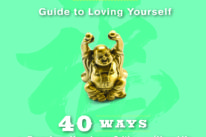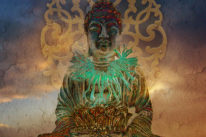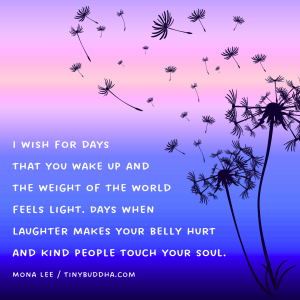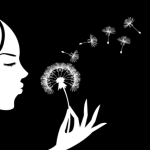
This month we’re celebrating the upcoming launch of Tiny Buddha’s Guide to Loving Yourself, a book about taming your inner critic that features 40 stories from Tiny Buddha contributors.
Throughout September, you’ll have a chance to meet some of them through daily interviews here on the blog.
Today’s featured contributor is Wendy Miyake, a writer and teacher who blog at Momochan Conquers the World and strives to hold onto her inner child as long as she can.
In her contribution for the book, she shares her experiences in becoming more authentic, and how we can benefit from being genuine, even when we’re scared to really put ourselves out there.
A little more about Wendy…
1. Tell us a little about yourself and your self-love journey.
I’m a forty-one-year-old writer and teacher. I am the daughter of two elementary school teachers, one of which would love it if I got a full time job as a teacher. The other one, my mother, always talks me out of it and tells me to follow my dream of being a writer.
I am currently in the process of finding an agent for my picture book manuscript, The Sky Blanket. And I am working through a revision of my young adult novel, The Daughters of Kasumi.
My self-love journey really began a few weeks before my fortieth birthday when our termite man told me that I was going to love turning forty. I stared at him rather skeptically because if forty was anything like thirty-nine, all I saw in my future was a lot of sighing.
I didn’t have a full time job. I wasn’t married. I had no kids to my name. I lived with my parents. And my new novel manuscript was going nowhere. In my mind, I thought, this guy may know termites but he knows nothing about a female turning forty
But you know, he was so right. There was something about turning forty that was magical and almost surreal. I’m not going to say it solved everything and I lived happily ever after. But something big definitely shifted.
I think it’s because at forty, you can finally see death on the horizon. In your twenties, he’s not even a shadow yet. In your thirties, maybe you can make out a silhouette. But when you hit forty, oh, you see him. And if that’s not motivation to live the life you want to live now, I don’t know what is.
Suddenly, at forty, I liked who I was and I knew now what I wanted. I wanted to continue to write picture books and novels. I wanted to meet an awesome man in my life who would knock my socks off.
I wanted to travel and see more of the world. I wanted to continue growing my blog. I wanted to love the people already in my life who have seen me through every obstacle and triumph that I’ve experienced. These were the things that really mattered to me.
2. Have you ever felt there’s “something wrong with you”? If so, why, and what’s helped you change your perception?
When I was in my late thirties and still unmarried, I thought there was something wrong with me because it seemed like everyone else my age was married. I thought, “Why not me?”
The truth is I don’t think I was ready yet. I didn’t know who I was and I certainly didn’t like who I was at the moment. But when I turned forty, I began to see what was unique and interesting about me and I began to like that girl very much. And when I like me for who I am, that means someone else can.
3. Have you ever thought something was a flaw only to realize that other people actually appreciate that about you? What was the “flaw”?
I always used to think I was too honest. I can’t help it. I’m one of those people that when I was three, I announced to the entire doctor’s office that my dad had diabetes. He had a slight blood sugar problem but apparently after I learned the word I needed to tell everyone.
I don’t know if I’ve gotten any better at forty. But one of my close friends said to me that she thought honesty was one of my best qualities. “If you were just honest, that would be hard. But you’re kind too. You think about people’s feelings before you say something.” Imagine that. Honest and kind.
4. What was your biggest mistake (that you’re willing to share), and what helped you forgive yourself?
My biggest mistake has been listening to other people. I think parents and friends really care about you so they don’t want you to suffer the road of a dreamer. They want you to be practical and get a full-time state job and work until you retire and then you can do what you want.
I listened to them for a while but inside I’ve always known that I needed to do something creative. While I still teach as a day job, I’m moving more and more of my time to writing.
5. Complete this sentence: When other people don’t like me, I…
…move on.
At forty, I just don’t have the patience to care about what every single person thinks about me. It’s too hard to please everyone!
6. What are some areas in your life where you’ve compared yourself to other people, and what’s helped you let go of these comparisons?
In my thirties, I felt like I needed to have the house, the man, the kids, the dream job, the whole nine yards of success because the people around me seemed to have that. That seemed to be the standard of happiness. But when you really get to know people, you realize that everyone has some area in their life that they feel insecure about.
That’s when I started to feel grateful for what I had. Yes, I lived at home with my parents but if I didn’t, I would’ve never known my parents as people and I would’ve never been as big a part of my nephew’s life as I am now. And because I wasn’t married, I had the freedom to dream and travel and have all these experiences that have helped me grow as a person and a writer.
7. What’s one thing you would tell your younger self about looking to other people to complete you?
If I could go back and tell my younger self something, I’d tell her to listen to her own voice. Get quiet and ignore everyone else. Take your time and get to know yourself as an individual so that when you do find someone who you want to spend the rest of your life with, you walk together on the path, side by side, not one following the other.
8. Have you ever felt afraid to show people your “real” self? Why—and what’s helped you move beyond that?
There have been many instances where I have not wanted to share my real self with others. In some situations especially when I was younger, I was definitely afraid. I didn’t want to show my true self or true feelings because it seemed like a sign of weakness.
While I do feel like I know my real self now that I’m older, I also feel less of a need to share that person with everyone. I think your real self is very precious and you should also be selective as to whom you share that part of you with.
9. What are the top three things you personally need to do to take good of yourself, mentally and emotionally?
Paying attention to my feelings, resting, and dreaming.
Once I get disconnected from my feelings then I have no compass to navigate everyone else’s voices. I make it a point to journal or meditate when I can. The main thing is to get quiet so I can hear my heart.
While I say resting is important, it is something I am not good at. I am the daughter of a Type A father. We know work. But I found that when I do rest, I get good ideas, way better ideas than when I keep working at something.
I think dreaming is one of the most important things in my life. I know it may sound corny but if you have a dream, life does have so much more meaning. I feel very honored to be working as a writer.
10. What’s something you do regularly that makes you feel proud of the difference you’re making in the world?
I don’t think I was always about making a difference in the world especially with my writing. But after my favorite uncle died and the earthquake and tsunami happened in Japan, I realized that my intention for writing really changed.
Writing isn’t just about me anymore. I want to write things that will matter, that will make a positive impact in other people’s lives even if it’s just in a small way. To remind myself of why I write and why stories are so important in healing the heart, I watch NHK documentaries on the survivors of the earthquake and tsunami in Japan.
I feel a strong connection with the children who were affected. I don’t think any child should have to face loss alone. When I hear their stories, I hold them in my heart and that’s what I write from now.
In fact, my picture book manuscript, The Sky Blanket, was written with my uncle and the survivors in mind. I want the children to have something to hold onto so that they will know in their hearts that love never dies.
*Note: I edited this post to remove info about the pre-order promotion, which ended on October 8, 2013. You can learn more about Tiny Buddha’s Guide to Loving Yourself here.
About Lori Deschene
Lori Deschene is the founder of Tiny Buddha. She started the site after struggling with depression, bulimia, and toxic shame so she could recycle her former pain into something useful and inspire others do the same. She recently created the Breaking Barriers to Self-Care eCourse to help people honor their needs—so they can feel their best, be their best, and live their best possible life. If you’re ready to start thriving instead of merely surviving, you can learn more and get instant access here.
- Web |
- More Posts













 Though I run this site, it is not mine. It's ours. It's not about me. It's about us. Your stories and your wisdom are just as meaningful as mine.
Though I run this site, it is not mine. It's ours. It's not about me. It's about us. Your stories and your wisdom are just as meaningful as mine.